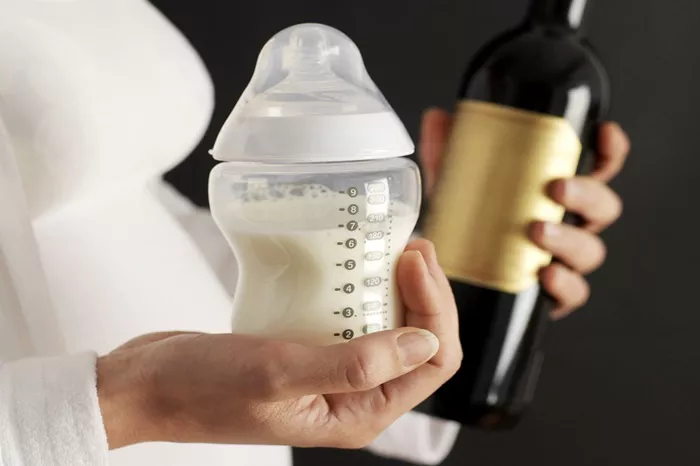Many new mothers wonder if they can have an occasional alcoholic drink while breastfeeding. It’s a common question, and it’s essential to understand the implications of alcohol consumption during this crucial period. The general consensus among health professionals is that moderate alcohol consumption is permissible, but it should be approached with caution.
Understanding Alcohol and Breastfeeding
How Alcohol Affects Breast Milk
When a mother consumes alcohol, it passes into her breast milk at similar concentrations to those found in her bloodstream. This means that if a mother drinks, the alcohol can reach her baby through breastfeeding. However, the concentration of alcohol in breast milk is relatively low compared to the amount consumed by the mother.
Factors Influencing Alcohol Levels in Breast Milk
Several factors influence how much alcohol passes into breast milk:
The amount of alcohol consumed: The more alcohol a mother drinks, the higher the concentration in her breast milk.
Timing: Alcohol levels in breast milk peak about 30 to 60 minutes after consumption and then gradually decrease.
Mother’s weight and metabolism: Heavier individuals and those with faster metabolisms process alcohol more quickly.
Food intake: Eating while drinking can slow the absorption of alcohol into the bloodstream, thus reducing its presence in breast milk.
Guidelines for Alcohol Consumption While Breastfeeding
Health organizations offer guidelines to help breastfeeding mothers make informed decisions about alcohol consumption. Here are some general recommendations:
Moderation is key: It is generally considered safe to have an occasional drink, such as one standard drink per day. A standard drink is typically defined as:
12 ounces of beer (5% alcohol)
5 ounces of wine (12% alcohol)
1.5 ounces of distilled spirits (40% alcohol)
Timing: To minimize the baby’s exposure to alcohol, mothers should wait at least 2 hours after having one drink before breastfeeding. This allows time for the alcohol to metabolize and decrease in the breast milk.
Pump and store: Some mothers choose to pump and store breast milk in advance if they plan to drink. This ensures that they have alcohol-free milk available for feeding.
Breastfeeding before drinking: Feeding the baby before consuming alcohol can reduce the likelihood of the baby ingesting alcohol through breast milk.
SEE ALSO: 25 Foods High in Fat for Breastfeeding
Potential Risks of Alcohol Consumption While Breastfeeding
While moderate alcohol consumption is generally considered safe, excessive drinking can pose risks to both the mother and the baby:
Impaired motor development: High levels of alcohol in breast milk can affect a baby’s motor development and sleep patterns.
Reduced milk production: Alcohol can inhibit the release of oxytocin, a hormone necessary for milk ejection, potentially leading to reduced milk supply.
Impact on maternal care: Excessive drinking can impair a mother’s ability to care for her baby safely.
Research Findings on Alcohol and Breastfeeding
Several studies have examined the effects of alcohol on breastfed infants and maternal milk production. Key findings include:
Alcohol and infant sleep: Some studies suggest that alcohol in breast milk can affect an infant’s sleep, making them sleep for shorter durations and disrupting their sleep patterns.
Milk production: Research indicates that alcohol consumption can reduce milk production by inhibiting the let-down reflex.
Infant development: Long-term studies have not found significant developmental issues in infants exposed to moderate levels of alcohol through breast milk. However, high levels of exposure are associated with developmental concerns.
Cultural and Social Considerations
Cultural attitudes towards alcohol consumption can vary significantly. In some cultures, drinking alcohol is a common social activity, while in others, it may be less acceptable. Breastfeeding mothers should consider their cultural context and social norms when making decisions about alcohol consumption.
Practical Tips for Breastfeeding Mothers Who Choose to Drink
Plan ahead: If you plan to drink, consider pumping and storing milk in advance.
Limit intake: Stick to one standard drink to keep alcohol levels low in your breast milk.
Hydrate: Drink plenty of water to help your body metabolize alcohol more quickly.
Eat while drinking: Consuming food can slow alcohol absorption and reduce its concentration in your breast milk.
Consulting Healthcare Providers
Breastfeeding mothers should consult their healthcare providers if they have any concerns about alcohol consumption. Healthcare providers can offer personalized advice based on individual health circumstances and breastfeeding goals.
Myths and Misconceptions
There are several myths and misconceptions about alcohol and breastfeeding:
“Pumping and dumping”: This practice is often misunderstood. Pumping and discarding breast milk does not speed up the elimination of alcohol from the mother’s system. It is only necessary to relieve engorgement if the mother is uncomfortable.
“Alcohol increases milk production”: Some believe that alcohol can stimulate milk production. However, research shows that alcohol actually inhibits milk ejection and can reduce milk supply.
Conclusion
In conclusion, having an occasional drink while breastfeeding is generally considered safe if done in moderation and with proper timing. Understanding the effects of alcohol on breast milk and taking steps to minimize exposure can help breastfeeding mothers enjoy social activities without compromising their baby’s health. Always consult healthcare professionals for personalized advice and guidance.
By following these guidelines, breastfeeding mothers can make informed decisions about alcohol consumption and continue to provide the best care for their babies.


